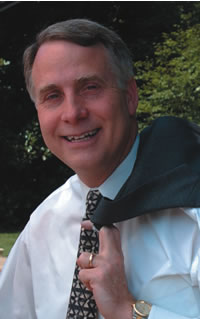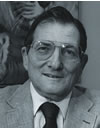
 Emory President James Wagner
Emory President James Wagner
On becoming great...
Historically, many universities with large medical schools have focused on the financial development of medicine, seemingly at the expense of other departments, an interviewer recently pointed out to Emory's new president, James Wagner.
The perception of a rift between the health sciences and the rest of the university needs to be bridged, Wagner responded. "Our arts and sciences programs deserve greater investment. But arts and sciences also should realize the resource we have in our School of Medicine. The reverse is also true. The School of Medicine needs to understand, and I believe it does, the value of being attached to a world-class university. With perhaps one exception, there are really no other truly great medical schools that aren't attached to an outstanding university. So as we move our medical school to further greatness, it must become a priority of the medical school to help the entire university become great -- including the arts, humanities, and social sciences."
Wagner also emphasized Emory's role in the community and the importance of seeking better partnerships that help advance the missions of our collaborators. "We have some good starts," he said, specifically noting our relationship with Georgia Tech in biomedical engineering, as well as in joint research programs. He called for growing partnerships with other educational institutions and the CDC. The relationship that Emory enjoys with Morehouse and with Grady should serve as prototypes for genuine, mutually beneficial partnerships.
Kudos and more


CORBY D'AMICO, Center for Heart Failure Therapy at Emory University Hospital, co-chairs the International Society of Heart and Lung Transplantation's Nursing and Societal Sciences Scientific Council.
HOWARD FRUMKIN, chair of environmental and occupational health, Rollins School of Public Health, was in the inaugural class of the Institute for Georgia Environmental Leadership, a program of the Governor's Environmental Advisory Council and the University of Georgia J.W. Fanning Institute for Leadership.
MARY GULLATTE, director of nursing, inpatient oncology and transplant services for Emory Hospital, received the 2003 Oncology Nursing Society Excellence in Patient/Public Education Award.
ALLAN LEVEY is the new chair of the Department of Neurology, succeeding MAHLON DELONG, who heads a new Neuroscience Center, which will take the lead in eradicating nervous system diseases through innovative, translational research.
RANDY MARTIN is president of the American Society of Echocardiography.
Neuro-ophthalmologist NANCY NEWMAN received the American Neurological Association's Distinguished Teacher Award.
JOE OUSLANDER, Wesley Woods' chief of medicine, is 2003 Continence Care Champion of the American Geriatrics Society.
JENNIFER PULLIUM, a veterinarian in the medical school's division of animal resources, received the 2003 Foster Award from the American College of Laboratory Animal Medicine.
JEFF SANDS serves on the Council of the American Physiological Society.
KENNETH WALKER, medicine, received the Marion C. Creekmore Award for his work as co-director of the Atlanta-Tbilisi Healthcare Partnership, which provides medical expertise, manpower, and supplies to the nation of Georgia.
KATHY YAUGHN, Emory University Hospital, was named Pharmacist of the Year by the Atlanta Academy of Institutional Pharmacy.
2004 recipients of the medical school's Dean's Clinical Investigator Awards are JACK ARBISER, dermatology; MARK MOSS, medicine; DOMINiQUE MUSSELMAN, psychiatry; ANDREW NEISH and CHARLES PARKOS, pathology; DAVID RYE, neurology; and ZACHARY STOWE, psychiatry. The three-year awards of $30,000 per year for junior faculty and $50,000 for senior faculty allow them to spend more time on funded research projects.
In this issue
From the CEO / LettersHow Nellie got her groove back
Trapping the mutant virus
Doing a 360 in the WLA
Moving forward
Noteworthy
On Point:
Not the same old, same old


Morton Silberman, assistant director of the Woodruff Health Sciences Center from 1988 to 1999, was "a star at Emory and a hero at the Atlanta zoo," wrote the Atlanta Journal/Constitution upon his death in August after a long struggle with chronic obstructive pulmonary disease. He held a variety of positions in his 25 years at Emory, from university veterinarian to the first governmental relations person in the WHSC. Heralding him as a pioneer in the treatment of rare, endangered, and exotic animals, Zoo Atlanta has named its diagnostic center after him.
Copyright © Emory University, 2003. All Rights Reserved.
Send comments to the Editors.
Web version by Jaime Henriquez.